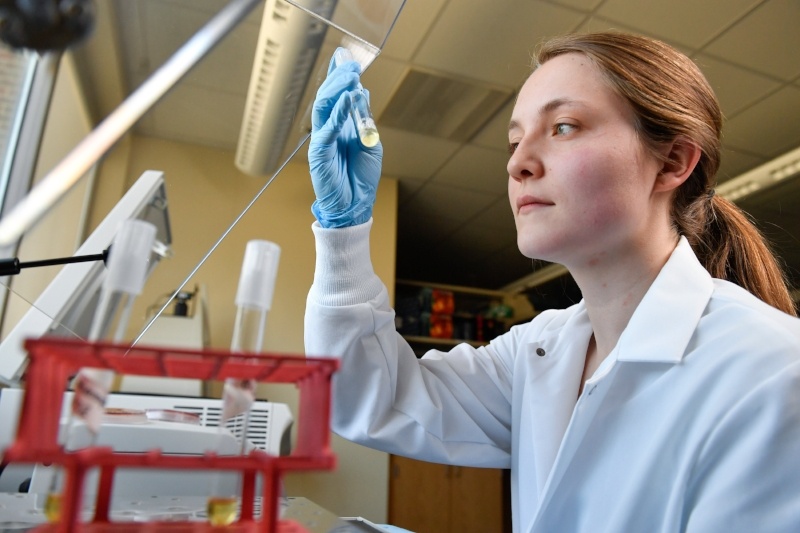
The field of physical therapy is an appropriate fit for mission-minded, ambitious, forward-thinking, and intelligent professionals. It's a highly demanding field, but for those dedicated to applying themselves to an advanced STEM education — and who want to help others live happier, healthier lives — a Doctor of Physical Therapy program could be the perfect fit.
Let's dive a little deeper and learn more about the field of PT along with what sets West Virginia University's Doctor of Physical Therapy program apart.
Working in Health Professions:
The field of physical therapy is expanding. The job growth rate will continue to increase as new medical technologies permit more disabling conditions to be treated, and as the population grows and ages, physical therapists will play a vital role. Interest in health promotion also increases demand for physical therapists to evaluate environments, develop exercise programs, and teach safe habits to the population.
According to U.S. News, in 2017 physical therapists made a median salary of $86,850. The highest paid 25 percent made $101,790 that year, while the lowest-paid 25 percent made $71,670. The salary for a physical therapist has increased at a rapid pace since 2010. The Bureau of Labor Statistics projects the physical therapy field will grow 28 percent between 2016 and 2026, with 67,100 jobs added during that time.
Work Environments for PTs:
Physical therapists are respected members of the healthcare community. They work with other healthcare providers such as physicians, occupational therapists, rehabilitation nurses, psychologists, social workers, dentists, podiatrists, speech pathologists, and audiologists.
Physical therapists are also able to work in a variety of environments. For instance, some popular work environments for physical therapists are:
- hospitals
- private physical therapy offices
- community health centers
- corporate or industrial health centers
- sports facilities
- research institutions
- rehabilitation centers
- nursing homes
- home health agencies
- schools
- pediatric centers
- colleges and universities.
With the expanding health care industry showing no signs of slowing down, it’s important that aspiring physical therapists recognize the importance of pursuing an advanced degree in this field. Doing so will prepare future leaders with the skills needed to make a tangible difference in the lives of others.
WVU's Doctor of Physical Therapy Program:
“WVU is a phenomenal university, and the Physical Therapy program is no different. Be ready to work hard and be challenged every day, but in the end, it will all be worth it. You will also meet some of your best friends in PT school because you are all going through the same challenges with a similar goal.”—David Wegert, WVU DPT Graduate
Faculty:
The faculty in the Division of Physical Therapy are active in scholarship in many areas, ranging from basic science investigations of muscle physiology, genetic factors related to back pain, and inflammatory markers in cancer patients, to outcomes studies related to stroke, balance and orthopedic problems. Each faculty member has an active scholarship program and collaborate in interdisciplinary programs with faculty in other departments and centers within WVU as well as researchers in other universities nationally and internationally.
Completion Option:
Students admitted into the Doctor of Physical Therapy program complete three years of combined classroom, laboratory, and clinical education, and part-time and full-time supervised clinical practice in various clinics in West Virginia and other states.
Outcomes:
A DPT degree is awarded upon completion of the program, which prepares the graduate to apply for examination for state licensure. A license to practice physical therapy is required by all states.
- Graduates will demonstrate basic and applied knowledge necessary to practice PT as a member of the health care team in diverse settings.
- Graduates will demonstrate the ability to make sound clinical decisions using information literacy skills, critical thinking, and scientific evidence.
- Graduates will find employment with special emphasis on recruitment and retention of graduates in WV.
- Graduates will adhere to core professional values.
- Graduates will demonstrate the ability to practice independently as collaborative members of inter-professional teams.
- Graduates will adhere to legal and ethical standards.
- Graduates will demonstrate a life-long commitment to the profession by activity in professional organizations, scholarship, education, and advocacy.
Learn more about the goals and outcomes of the program here, and in the meantime, we invite you to request more information today to learn more about your future as a DPT student at WVU.
As an aspiring STEM professional and leader, we invite you to explore our newest interactive resource — A Guide to Graduate Programs and Careers in STEM!


-489630-edited.jpg)






